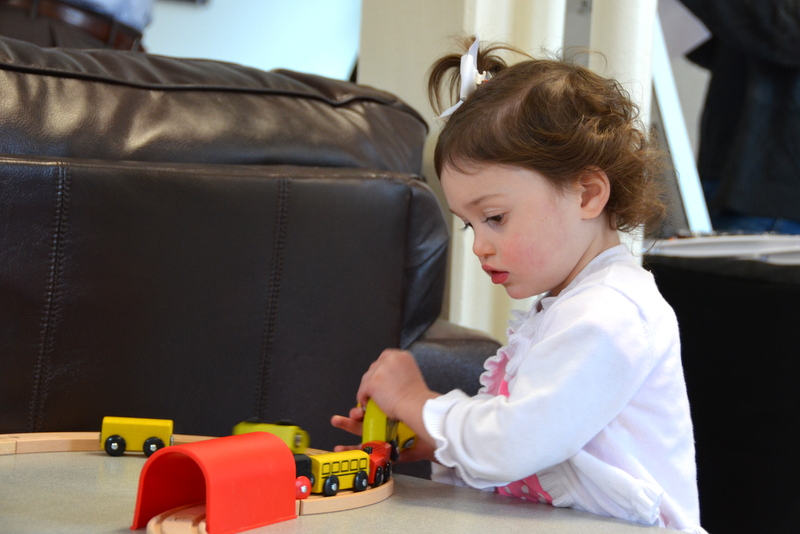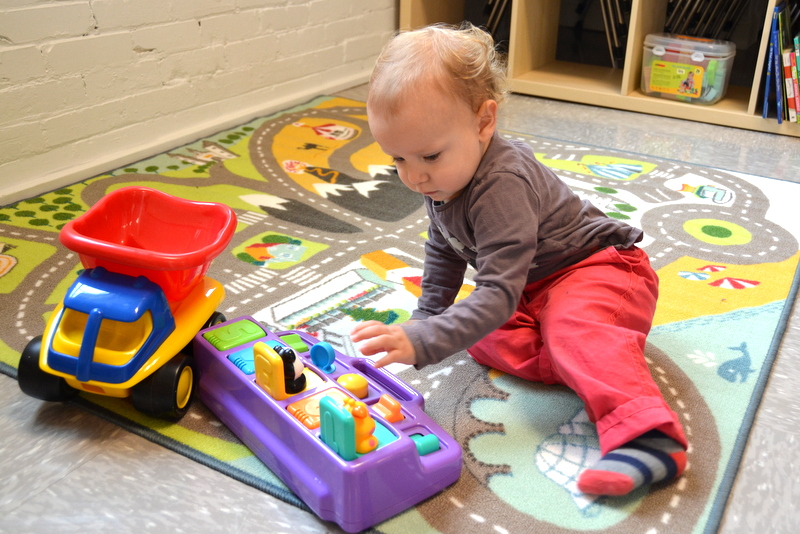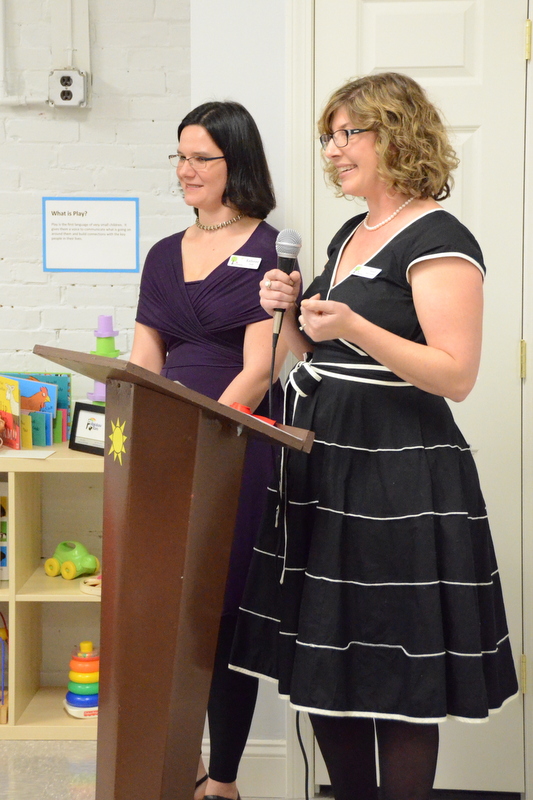Parenting and the Power of Play

For 15-month-old Eliot, the choice was clearer. He seemed drawn to the sea of cotton fluff.
“He’s having a lot of fun,” says his mom, Jennifer Korthas.
Liliana and Eliot, along with their moms, were among the many children and parents who headed to The Center for Parenting & Play in Biddeford on opening day in November.
“I think it’s great,” says Mandy Greene, Liliana’s mom. “I mean, there are not very many places around here where you can just, kind of, go and feel safe and allow your kids to roam around and play and explore.”
“It’s really nice. It’s clean. It’s set up well. The staff is friendly,” says Korthas. “We didn’t have anything like this, where kids could go and play, and you could meet other parents.”
The Center for Parenting and Play is the newest offering of Saint André Home in Biddeford. It was established with the intent of strengthening family relationships and communication through play.
“Children’s first language is play,” says Sarah MacLaughlin, LSW, adoption manager at Saint André Home. “Children don’t want to do our grown-up, serious stuff; they want to do fun stuff.”

The new center will offer community playtime, which drew parents like Greene and Korthas, as well as play therapy, counseling services, supportive visitation, and parenting classes.
“The center provides us with the opportunity to be a greater resource to the community, being able to provide more families with a needed array of services,” says Reid Scher, LMSW, executive director.
The center is designed with children ages 0-5 in mind because it is during those years that language, social skills, and emotional recognition are rapidly developing. Families being served by Saint André will include those referred by the Maine Department of Health and Human Services, the courts, and pediatricians, as well as parents who come in recognizing they could use some assistance.
“According to the Signs of Safety, a strengths-based approach to child welfare used in the state of Maine, protective factors that reduce family involvement with the child welfare system include positive parent-child relationship, high level of parental education, sound parental coping skills, and awareness of child development. Additionally, parents who learn new ways to play with their children are less likely to lose their temper,” says Diane Madden, director of marketing and development. “It’s a prevention model program. We hope to be a pillar of prevention here.”

“Connect, connect, connect -- children really flip when they don’t feel connected to their caregivers, so making sure you are seeing your child, making eye contact, making good physical contact,” says MacLaughlin.
Saint André counselors and staff work with parents to help them understand how the brain works, so they’ll better understand their children’s behavior, as well as their responses to it.
“There really is a lot we know about how brains work in adults and how brains work in children and how we can use what we know about that to help everybody, kind of, guide and get along and be more peaceful,” says MacLaughlin. “Every child is different. Every child responds to different kinds of approaches, but calm and regulated adults, who aren’t getting triggered into their emotional brains, are going to be able to execute any sort of approach in a more effective way if they are coming from a more mature, higher level part of the brain.”
The Center for Parenting & Play is a place where childhood emotions are expected and where exploration is encouraged. It includes small rooms for one-on-one therapy sessions and, then, the larger play area, which is full of toys for stacking and spinning, bouncing and balancing, and climbing and creating.
“There are good ideas for the kids, a sensory table and things like that,” says Korthas.
“I think it’s great. They have so much stuff,” says Erin Bray, mother of 21-month-old Josie. “It will be really nice in the winter, also, to have an indoor place to go and get out of the house, so she can play with other kids and be entertained. She’s almost two, so she needs the social interaction.”
.JPG)
“We want it to be a community space, low barrier,” she says.
The opening of The Center for Parenting & Play coincides with the celebration of Saint André Home’s 75th anniversary and is indicative of how Saint André has continued to evolve without losing sight of the charism and founding mission of the Good Shepherd Sisters of Quebec, who still sponsor the home today.
“I think it’s wonderful,” says Sister Therese Bouthot, SCIM, who served on the board for many years. “We did a great job years back, but now, this is more attuned, I think, to what today’s needs are. It takes people with vision, I think, to see what we need to do to keep it going, and I think this one aspect that is going on here is going to help us to move into the future.”
“The mission has never changed. It is still women and children,” says Sister Viola Lausier, SCIM, finance director. “We’ve adapted to the culture, and it keeps changing."
The Good Shepherd Sisters of Quebec founded Saint André in 1940 as a home for unwed mothers. Its mission then, as it is now, was to serve young women and children in need, to strength and restore family life, and to promote the dignity of each person who comes to the home with a need. It serves all families regardless of their religious affiliations.
“If a person wants to have help, we’re going to help them,” says Sister Therese.
(1).JPG)
Although the elimination of state funding forced it to close three of its group homes, it continues to operate a home for pregnant women in Biddeford, which through the SCIM Foundation and other benefactors. Sister Viola is always happy to accept donations of baby clothes and other items to help the new mothers.
Saint André also offers adoption services. It conducts home studies for adoptive families in Maine who are working with adoption agencies in other states or countries, as well as serving as the placing agency for some in-state adoptions, a program it is looking to expand.
“We are providing resources to support women who are considering adoption,” says MacLaughlin.
Saint André is also moving forward with plans to open Maine’s first residential safe house for survivors of human trafficking. Through its recently-launched “Project TLC,” it is looking to open a home next May, where it will be able to provide treatment services for six to eight women in need of a secure place to start to rebuild their lives.
Whether it’s through providing safe havens or playful places, care and concern for others have remained at the heart of Saint André’s mission for 75 years.
“It’s about love and kindness. It’s about being the kindest person you can be to everyone you interact with,” says MacLaughlin.
“We’ve always been committed to helping women and children, and this is what this is all about, and bringing joy, bringing happiness and joy to families,” says Sister Therese. “I think this is important, very important.”










